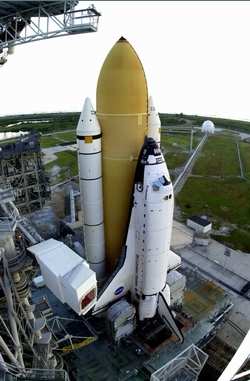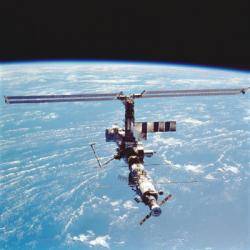States $2.9 Billion Request Will Threaten 2010 Shuttle
Retirement Date
 A congressional effort
to add another three shuttle flights to the International Space
Station before the projected 2010 retirement of the shuttle program
was vehemently rejected by the White House on June 10 stating the
$2.9 Billion request was "inconsistent with the administration's
fiscal policies."
A congressional effort
to add another three shuttle flights to the International Space
Station before the projected 2010 retirement of the shuttle program
was vehemently rejected by the White House on June 10 stating the
$2.9 Billion request was "inconsistent with the administration's
fiscal policies."
The Houston Chronicle said Wednesday the Bush
Administration’s Office of Management and Budget issued the
unusually strongly worded statement of administration policy
criticizing the Congressional effort and implied a veto was likely
unless changes were made.
The action followed six days after the House Science and
Technology Committee endorsed legislation that would provide $17.6
billion for the coming fiscal year to NASA plus an additional $2.9
billion for the three flights.
Members of both parties are concerned the retirement of the
shuttle program in two years will leave the U.S. space
program’s transportation requirements to the $31 Billion ISS
overly dependent on the Russian Soyuz program for the five year gap
until the next generation of American space vehicles is ready for
use.
The White House statement additionally insisted that "the NASA
administrator's authority to make the final determination on
shuttle flights based on safety considerations must be preserved,"
regardless of the feelings of Congress.
The statement accused lawmakers for micromanaging space agency
operations that “would almost certainly result in several
serious impacts and risks" including potential, unspecified risks
to astronauts according to the White House.
The proposed legislation made references to requiring NASA to
deepen international cooperation in the next generation of manned
U.S. space operations. The White House took exception to the
reference saying the provision ordering international outreach
"directly infringes upon the president's authority to conduct
foreign affairs."
Such criticism by the White House to a program crucial to Texas
left Republicans of the state in a quandary.
Some, like Rep. John Culberson, R-Houston, said they would push
for additional NASA funding, with or without White House
approval.
Disagreeing with the White House’s position of additional
missions jeopardizing the 2010 retirement date, Rep. Michael
McCaul, R-Austin felt the additional flights are crucial to the
operation of the ISS.

"The contingency flights are necessary to make sure the space
station is fully equipped entering that period when the U.S. will
have no spaceflights," he said.
After the House gives its NASA funding plan final approval, the
Senate, with strong bipartisan support for increased funding in the
Senate, will act.
Without directly addressing the White House statement, Sen. Kay
Bailey Hutchison, R-Texas, member of the Senate Appropriations
Committee, said she considers completion of the space station
an issue of "utmost importance" and will continue working "to
increase NASA funding so we may close the gap in continuous
spaceflight," according to spokesman Matt Mackowiak.
Democratic voices in the House were far more critical of the
Bush administration’s position on NASA funding.
Rep. Sheila Jackson Lee, D-Houston, said it was "truly
unfortunate" that Americans cannot rely on the administration to
support legislation to fund NASA programs.
Rep. Nick Lampson, D-Stafford, said additional NASA funding and
shuttle flights would "enable the United States to remain the
predominant leader in technology and space exploration." Lampson
has been designated by Democratic leaders as the next chairman of
the House subcommittee with jurisdiction over NASA if he wins
re-election in 2008.
Lampson added the Bush administration was missing an opportunity
to "grow the (Houston) economy and increase jobs at Johnson Space
Center" with its position and probable veto if the measure passes
the Senate.
 ANN's Daily Aero-Linx (05.06.25)
ANN's Daily Aero-Linx (05.06.25) ANN's Daily Aero-Term (05.06.25): Ultrahigh Frequency (UHF)
ANN's Daily Aero-Term (05.06.25): Ultrahigh Frequency (UHF) ANN FAQ: Q&A 101
ANN FAQ: Q&A 101 Classic Aero-TV: Virtual Reality Painting--PPG Leverages Technology for Training
Classic Aero-TV: Virtual Reality Painting--PPG Leverages Technology for Training Airborne 05.02.25: Joby Crewed Milestone, Diamond Club, Canadian Pilot Insurance
Airborne 05.02.25: Joby Crewed Milestone, Diamond Club, Canadian Pilot Insurance




